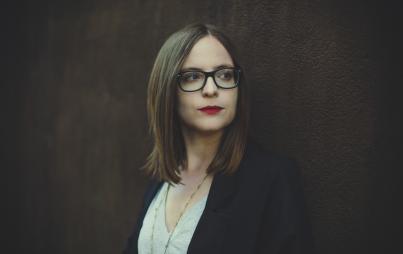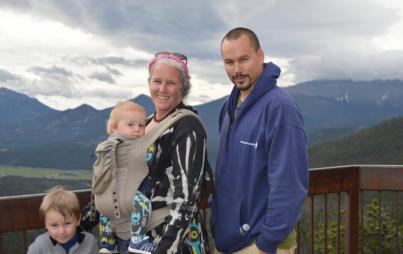
What I love, what I’m most interested in (at least in terms of written and spoken word), is the telling of stories.
I tell stories. It’s what I do. The format changes in small ways over the years, but the meat of it remains the same.
There’s plenty to bemoan about the state of journalism today. And there are plenty of people willing to analyze it at great length. The journalistic landscape has changed dramatically; many newspapers have folded as we read more and more online and less and less on the thin paper.
In the midst of this strange sea, the personal essay has risen above. Last September, Slate published a piece that tackles everything that is wrong with, as they put it, with “the first-person industrial complex.” There’s a lot to say.
However, I still unapologetically love reading — and especially writing — personal essays.
I’ve always loved to write, and as a young person who read boatloads of fiction, I assumed that fiction was the path for me. When I was a kid, the binary worlds of fiction and nonfiction seemed separate and remote, they didn’t reach out and touch each other, and no one ever mentioned literary nonfiction to me.
I didn’t want to write science textbooks; I wanted to write stories! But there was a problem, a problem I’m certain my mother will scold me for mentioning to you.
I lacked imagination. I still do.
And now I can hear her — my mother — in my head, saying, “You were one of the most imaginative children I have ever met! You were always doing creative things!”
Maybe that’s true. Maybe it’s nuanced and complicated. I’m willing to buy that.
But my imagination worked, and still works, in specific ways. Whenever I tried to make something up from scratch, it somehow just ended up to be a copy, an imitation, of something else. And we’re not talking about the Well, The Lord of The Rings draws on a lot of earlier mythology to create a rich fantasy world kind of imitation here.
No. We’re talking like, at age 7, I excitedly told all of my little friends that I had “written a song” while swinging on the swing set, but it turns out I had actually just sung “Fly Like An Eagle” by Seal under my breath. Yes, that really happened.
It didn’t get easier as I grew up. In high school, I tried desperately to write short stories, but none of them were very good. In fact, they all ended up being about a character who was even more like me than Holden Caulfield is like J.D. Salinger (I like to affectionately call those the “Batherine Stories”).
But what I did write, and write constantly, were diaries and journals. I kept notebooks and 3-ring binders filled with observations about my life that I thought were interesting. Sometimes I worried that these personal stories were too navel-gazing, but I still held on to them, hoping that someday someone would want them.
And then I discovered Livejournal, and suddenly a whole new world of writing about myself opened up to me. I was probably 17.
♦♦♦
I don’t think I heard the term “personal essay” until I picked up a David Sedaris book on a whim. It was funny and delightful, yes, but I was also tickled by the very concept.
Wait, this person is just writing true stories about his life and his family, and there gets to be a whole book about that? That’s perfect! That’s what I want!
When I tried to find the word to describe what I was in love with about it, someone said, “Well, yeah, they’re personal essays.”
♦♦♦
I tell stories. It’s what I do. The format changes in small ways over the years, but the meat of it remains the same. What I love, what I’m most interested in (at least in terms of written and spoken word), is the telling of stories.
When I was pursuing a painting career, I told stories drunk at art openings. I’ve told stories standing on rickety stages. I’ve written poems, but they’re the kind of poems that read less like flowery metaphors and more like OK, so this is what happened.
I have even had the honor to deliver sermons on several occasions, and when I write a sermon, it is always, always, woven with and held together by personal stories.
So when, this last year, I finally started to sell my personal essays, it felt like my world was fundamentally changing. My world was opening up in a way that was powerful and important for me. But at the same time, everything stayed very much the same.
I still had my stories, I still had the burning desire to share them, but now I also had something else. I had enough money to pay my damn electric bill.
I wish we didn’t live in a capitalist society where everything is valued based on its ability to create wealth. I wish things were different. But I live in the world as it is, and I am poor, and I have a small child.
When I discovered that there was, and is, a paying market for this thing that I already loved to do, it was a godsend.
Nowadays, when people ask me, “What do you do?” I confidently respond, “Oh, I talk about myself on the internet for a living!”
But I am a working-class woman without a college degree, and this is capitalism. I have never, not ever, not felt exploited by the work I’ve done to earn wages.
Of course, there is a dark underbelly to the magical economic forces that allow me to get paid for doing what I love.
It isn’t a particularly lucrative profession, to be sure, and plenty of people experience burnout. And there are publications out there, and plenty of them, that aren’t so much looking for Writers as they are looking for People Who Have Had Horrible Things Happen To Them.
Editors cut things to make them sound more controversial, slap on headlines for maximum clicks, and then when the story goes viral, the author is left to deal with the fallout. I have dealt with editors who have been less respectful than I would like, editors who seemed not to care that publishing certain things could put real people in real danger.
We need more accountability by those who actually hold the power.
But I also think we shouldn’t throw the proverbial baby out with the proverbial bath water.
In an online writer's group, I saw several people complaining about the current ubiquitousness of the personal essay. These were primarily people who had written personal essays in the past but had since moved on to more traditional, reported articles.
They had very real and important things to say about it. One person spoke of “constantly mining your life for content instead of living it,” and I could absolutely see how that would be a good reason to need to step back from that sort of work.
And then I read several different versions of the same complaint: “It’s like selling off bits of yourself for scraps.”
There it was. The thing that was supposed to feel gross and dehumanizing about my line of work.
But I am a working-class woman without a college degree, and this is capitalism. I have never, not ever, not felt exploited by the work I’ve done to earn wages. I’ve worked in retail selling everything from cheap knick-knacks to nice dog food to oil paint, and it always felt dirty. I’ve poured coffee for the elderly and worked in the nonprofit industrial complex and given surveys over the telephone.
And I can honestly say, selling my labor for scraps felt worse.
At least now I’m selling something I love.








